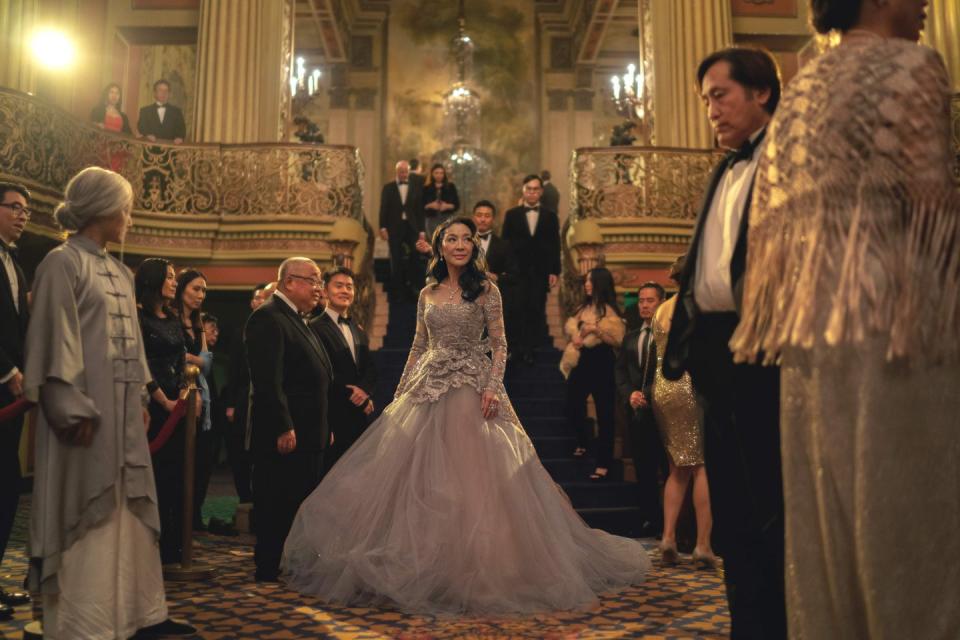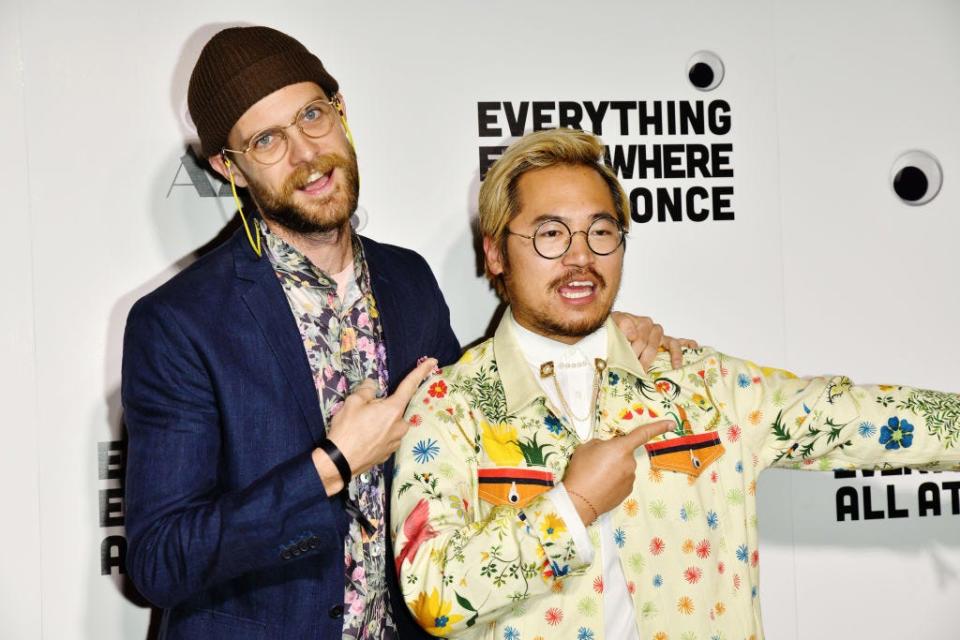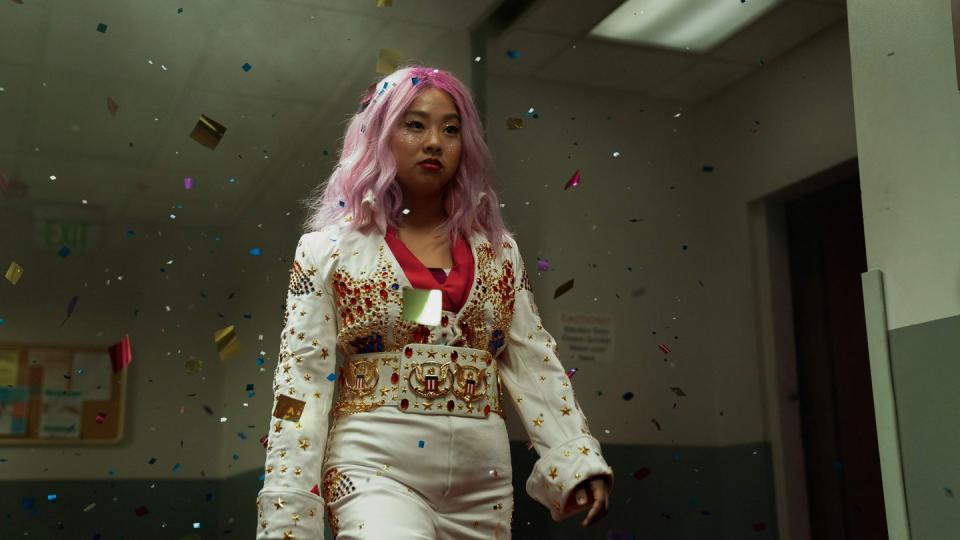Everything Everywhere All At Once directors are glad to talk about 'Big Nose' controversy

Everything Everywhere All At Once has debuted in the US to rip-roaring success — and deservedly so. The film, co-written and directed by the artistic duo known as Daniels (Dan Kwan and Daniel Scheinert), explores the tenuous relationship between a young queer woman Joy (Stephanie Hsu) and her mother Evelyn (Michelle Yeoh) via a multiverse-hopping visual extravaganza that manages to tug on heartstrings while also being thrillingly entertaining.
Yet no film can escape critique — after all, that is literally our job. And with the breakneck news cycle of Twitter, it's hard to escape the feeling that often mountains are made out of molehills.
But sometimes molehills are mountains — which in its own way was what Daniels were exploring through their film. As Kwan put it: "We wanted to firmly root the world in this space of microaggressions." Minor Everything Everywhere All At Once spoilers follow.

One such microaggression is when Evelyn refers to a woman visiting the laundromat as 'Big Nose'. The problem? Big Nose is Jewish. She's not just Jewish (like your writer here), but every conceivable Jewish American Princess stereotype, played with hilarious aplomb by Jenny Slate.
Kwan said: "It was meant to be a world in which everyone was mean to each other, but not intentionally. There's fat-shaming, there's sexism, there's racism, there's just a lot of just microaggressions that come up from the fact that when you live a busy life and you're so distracted, you just can't see each other — you don't see humans, you're not afforded that time. By the end, when [Evelyn] has the power to see people fully you can really see [her] transformation."
On the face of it, Big Nose is one of those microaggressions that fill Everything Everywhere All At Once, but unlike the others, it isn't explored, rectified, or given context — it isn't part of Evelyn's transformation. This leads us to wonder if it was ever meant to be.

"I'm glad you've asked this question," Scheinert says, and Kwan and Scheinert confirmed that Slate's character was meant to have her own moment in the 'empathy fight' as Kwan calls it.
"It was one of the disappointing things of having a movie that was bloated — we had to cut things. A couple of characters had to go and Jenny's was one of them." Kwan goes on to describe the scene they cut:
"They have this little moment where Jenny's character comes in with a weapon and they struggle over it for a moment and [Evelyn] turns it into a phone and becomes a FaceTime phone call with [Slate's character's] family, and her son is begging her to come to his birthday party."
Scheinert added: "There was more audible dialogue in the intro about her being estranged from her husband, and there being a birthday party that she's not invited to, which is…"

"…Why she ends up going to the laundromat party [later in the film]," Kwan continues. "Because even though she's this seemingly mean-spirited person it's because she has no one, right? So that there's going to be more of [that] through a thorough connection."
Given the scene had to be cut, the microaggression of 'big nose' exists without any other context or growth, unlike the other examples. Kwan says: "One of the weird blind spots that happened was that in Chinese culture, everyone who is white is called 'Big Nose'. It's nothing to do with the Jewish people, which now we're realising, 'Oh, f**k'. This is like that weird alchemy that happened when we didn't — we had gotten in a blind spot."
"In China whenever a white person comes in, it's something they might say. It's simultaneously because for some reason China – like [other] Asian cultures – fetishise the big nose, they want a big nose and it's also kind of mean-spirited. It's a very strange, negging thing that we do."

Now, Kwan says, they're realising the problem: "Of course, the Jewish community could totally interpret it like that."
"Understandably," Scheinert says.
"Yeah, understandably. I was like, I don't blame them for being – if they are – offended." Kwan goes further, unprompted: "But now we're realising: oh, the biggest offence of that whole thing is the fact that we just never gave her a proper name in the credits, right?"
Slate's character is in fact listed as Big Nose in the credits. "It's something we're actually going to be changing for the digital release."
"We're not proud of that name," Scheinert interjects.

"Yeah. Exactly. Firstly, it was like it was a shorthand because — out of our laziness. That's what she was called in the movie, let's call her that. But now we can see how dehumanising it is.
"It's not lost on us the irony of the fact that a movie in which we're exploring the fact that when things are too complicated and too messy, you miss each other, and hurt each other. And in this movie, in which we were holding [ourselves to a higher standard], we're trying to do too much. We missed certain blind spots."
We've long considered that the line for what constitutes a dealbreaker in a film is down to the individual, and that no individual wholly represents their community. For this writer, the film's meaning and messages weren't tainted by this characterisation, and would still recommend the film highly for the moving, thrilling, and deeply emotive story it tells.
And then, as is the beauty of cinema, each of us is free to make up our own mind.
Everything Everywhere All At Once is out in UK cinemas on May 13.
You Might Also Like

 Yahoo News
Yahoo News 
